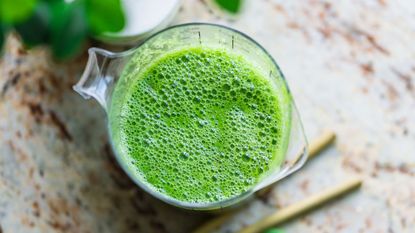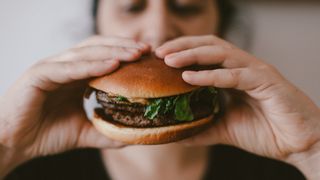How to eat healthily (without depriving yourself)
Expert tips to eat healthily that won't leave you feeling unsatisfied


We all know how to eat healthily – it's just putting it into practice isn't always so easy. The thing is, you don't need to deprive yourself to eat well and fuel your body. Food should be a pleasure. It's when you start cutting certain things out of your diet that it can lead to ill health.
You see, when you eliminate food groups, you're also reducing the nutrients and vitamins your body needs to function efficiently. But more than that, creating a checklist of so-called 'good' and 'bad' foods means you're potentially setting yourself up for failure and negative feelings when you deviate from what your restrictive eating plan.
Tell yourself food isn't the enemy – it's what your body needs to do its job! Focus on positive ways to eat healthily, from clever sugar swaps, using spice to kick-start your digestion and boost immunity, and reducing stress to blast tummy fat. Here's how
- Watching your wallet? Here's more advice on how to eat healthily on a budget
- Improve overall health with these tips for how to lower cholesterol
- ... and how to lower blood sugar levels
1. Practice mindful eating

Sometimes, cravings are based on habit rather than hunger – taking a moment to tune into your body can help you recognise this
The fact is, certain foods are simply designed to be craved. The food industry even created something called 'the bliss point' – the perfect combo of sugar, salt, and fat that makes processed foods difficult to resist.
"Of course, it's fine to enjoy these foods. But if you want to know how to eat healthily and navigate your cravings, you must first become aware of the power that some of these foods may hold," explains health and mindfulness coach Louise Murray.
"Frequent exposure to these processed and sugary foods is likely to increase desire for them," says Louise. "They tend to be higher in calories and fat and lower in protein and fibre – they usually don't offer much nutritional value aside from energy. Sometimes people simply desire a food or snack because they're used to having it at a certain time or place. You may gravitate towards a particular food out of routine.
"Rather than going on autopilot, take a moment to tune in to your body. A moment of mindfulness may be enough to help you distinguish between craving something out of habit rather than hunger, and resisting the urge."
Get the Fit&Well Newsletter
Start your week with achievable workout ideas, health tips and wellbeing advice in your inbox.
2. Stress less

Stress puts the body into a fight or flight state, in which it wants to obtain energy quickly
If you want to know how to eat healthily, one crucial thing to do is to reduce your stress levels. As Second Nature, nutritionist Tamara Willner explains: "High levels of circulating cortisol can increase our appetite and motivation to eat. Research has found that people who had higher levels of this stress hormone were more likely to snack throughout the day, eat more food overall, and have higher BMI compared to those with lower levels of cortisol."
This is because the body gets tricked into thinking it's in a state of 'fight or flight' and it drives our desire to obtain energy quickly, so we're fuelled and ready to face the perceived threat. But if we don't end up using this extra energy, we store the excess as fat, resulting in weight gain in the long term.
"Interesting, research has also found that cortisol may increase the storage of visceral fat, which is the stomach fat that lives under the muscle in our abdomen," says Tamara. "Visceral fat is believed to be more dangerous to our health compared with peripheral fat, because it sits around our vital organs."
- Want to try a specialist diet? Here’s how to lose weight with keto
- Healthy advice for how to lose weight by fasting
3. Head to the Med
Increasing your intake of good quality fats and protein will help you feel fuller, which in turn can reduce hunger pangs and sugar cravings, says nutritionist Becs Steele, from B Well Nutrition.
Becs says: "Following this type of Mediterranean-style anti-inflammatory diet, which includes lots of oily fish, lean meats, fresh fruit, vegetables, seeds and pulses, helps the digestive system do its job properly. These foods are rich in gut-friendly fibre and prevent huge swings in blood sugar - which can cause us to reach for quick-fix snacks for an energy boost. They can also help to maintain a healthy weight."
Good quality fats give the brain and nervous system a boost, create hormones and provide fat-soluble vitamins into the bargain. Replace flavourless vegetable oils with olive oils and butter and enjoy full-fat diary products such as cheese and yoghurt.
4. Spice it up
Tummy troubles, including bloating, constipation and IBS, are a sign that food isn't being properly broken down. Keep your digestive and immune system healthy by eating fresh ginger, which is a potent antioxidant and anti-inflammatory (wards off illness and disease).
This clever spice stimulates digestion and bowel function and relieve bloating, cramping and nausea. Ginger has even been known to ease the symptoms of PMS (Hallelujah!). Grate it into hot water with a squeeze of fresh lemon for an invigorating start to the day, or whizz it into curries and vegetable juice for an extra zing. Don't like the taste of ginger? Try Nature's Best Ginger Capsules for all the benefits of ginger in one swallow.
- For juicing, we love this Philips easy-to-clean Viva Collection juicer
5. Swap sugar for something equally satisfying

Added sugars are everywhere – not just in sweets
Added sugars and sweeteners are everywhere – even in some toothpaste (watch out for saccharin, sorbitol or aspartame) – so if you want to know how to eat healthily, cutting back on the sweet stuff is a good place to start. As nutritionist Becs Steele, from Bwellnutrition.co.uk explains: "The biggest problem with sugary foods is they're tasty and highly calorific but they don't make you feel full - and even trick you into wanting more food."
So what can you do? "If you're a fan of baking, try using sweet potatoes, beetroot, bananas, apple puree or a small amount of dates to sweeten your cakes," says Becs. "While these still contain natural sugars, they are also packaged with lots of fibre and 'resistant starch', meaning they cause less of spike in your blood sugar levels. You can also use protein like coconut and ground almonds in cakes to help balance blood sugar."
"Be careful when simply replacing white sugar with unrefined alternatives such as maple syrup, coconut sugar, rice syrup and honey. They have some nutritional benefits over processed white sugar, containing certain vitamins and minerals, but they have the same effect on our blood glucose and can be just as addictive, so it's best to steer clear for a while, until cravings are under control."
Maddy Biddulph is a freelance journalist specializing in fitness, health and wellbeing content. With 25 years in consumer media, she has worked as a writer and editor for some of the bestselling newspapers, magazines and websites in the US and UK.
She is also a qualified L3 personal trainer and weight loss advisor, and helps women over 40 navigate menopause by improving their physical and mental strength. At Maddy Biddulph Personal Training, she runs one-to-one and small group training for menopausal women who want to get fit to ease symptoms and feel like themselves again.